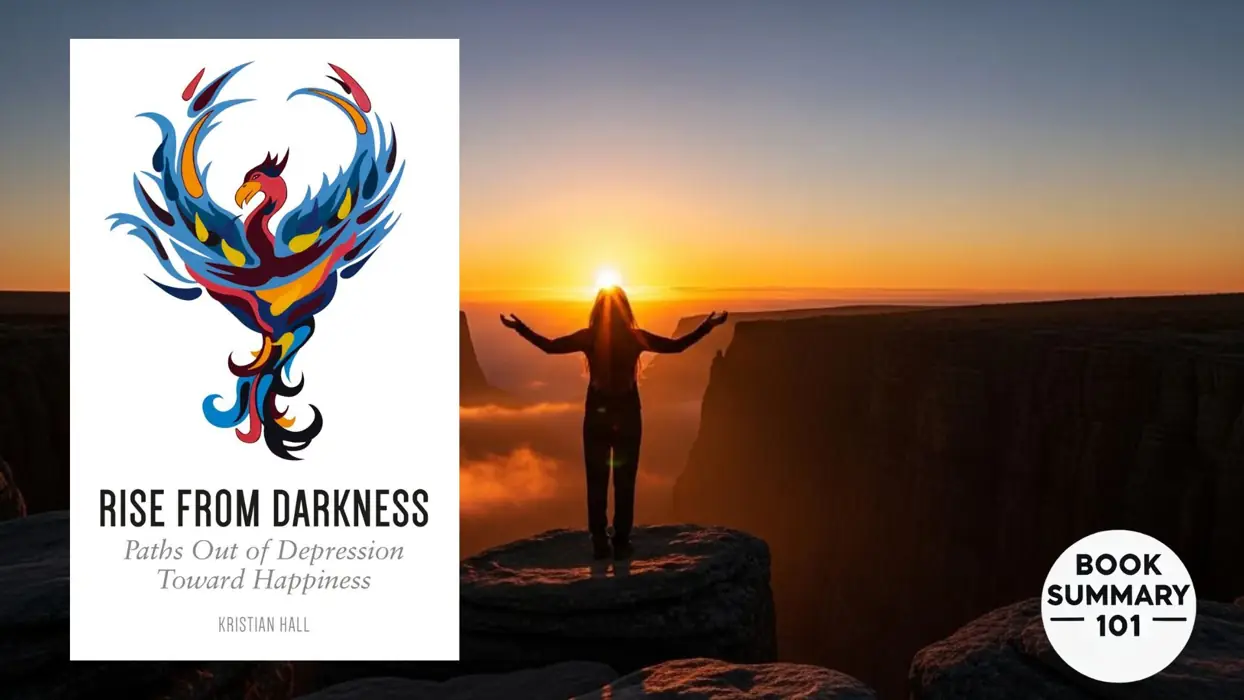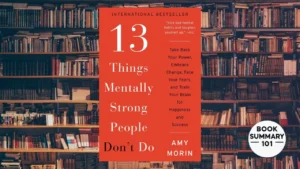Are You Stuck in the Shadows? Here’s a Way Out
Depression can feel like a never-ending tunnel. The struggle to even get out of bed, the negative thoughts, the guilt—it’s all-consuming. But in Rise from Darkness: How to Overcome Depression through Cognitive Behavioral Therapy and Positive Psychology, Christian Hall opens a door to healing, combining proven psychological techniques with a powerful, compassionate approach to mental health. If you or someone you love is dealing with depression, this book could be the first step toward reclaiming joy.
Why Read This Book?
Christian Hall’s approach is practical, relatable, and most importantly, hopeful. He integrates two incredibly effective tools in mental health—Cognitive Behavioral Therapy (CBT) and Positive Psychology. But he doesn’t just preach theories or use clinical jargon. Instead, he makes the methods feel personal and accessible. Hall’s tone is conversational, like a friend who understands what it’s like to be trapped in darkness and wants to help you find your way out.
If you’ve tried other methods, maybe even therapy, but you feel like something’s missing, this book offers a fresh perspective that blends self-reflection with actionable steps.
Lessons That Light the Way
1. Understanding Depression and How CBT Can Help
Depression can feel like an invisible weight that’s impossible to lift. In this section, Hall begins by explaining what depression really is and how it impacts our thoughts, emotions, and behaviors. He goes beyond the standard definitions and delves into how depression manifests in unique ways for different people, giving readers a sense of relief in knowing they’re not alone in their experiences.
Hall introduces Cognitive Behavioral Therapy (CBT) as one of the most effective, research-backed tools for managing depression. CBT is based on the idea that our thoughts, feelings, and behaviors are all connected. When we’re caught in a depressive spiral, it’s often because of a cycle of negative thoughts leading to feelings of hopelessness, which then lead to behaviors like isolation or avoidance. Hall explains how CBT can help us break this cycle by recognizing and changing those negative thoughts.
This section provides readers with a foundation of how CBT works and why it’s so powerful for treating depression. If you’re struggling to understand what’s happening in your mind, this section alone can be a huge eye-opener.
2. The Power of Challenging Negative Thoughts
One of the most paralyzing parts of depression is the constant stream of negative thoughts—“I’m not good enough,” “I’ll never be happy,” “What’s the point?” These thoughts can feel automatic and unchangeable. In this section, Hall shows readers that these thoughts, while powerful, are actually distortions of reality that can be challenged and changed.
Hall introduces readers to cognitive distortions—like “all-or-nothing thinking,” “catastrophizing,” and “filtering” (where we only focus on the negative). He provides real-life examples of how these distorted thoughts show up and how they impact daily life. For example, maybe you’ve had a bad day at work and immediately think, “I’m a failure.” Hall shows how you can challenge this thought, break it down, and replace it with something more balanced and accurate.
This section is full of exercises to help readers identify their own patterns of negative thinking. Hall walks through techniques like “thought diaries,” where you write down your negative thoughts, analyze them, and find evidence against them. This hands-on approach can be incredibly liberating for anyone struggling to overcome their inner critic.
3. Daily Practices for Lasting Change
Small, consistent changes in your daily life can create a big impact. This section of Rise from Darkness is all about helping readers build healthy habits that support mental well-being. Hall emphasizes that while changing our thought patterns is crucial, it’s equally important to create a lifestyle that fosters happiness and resilience.
Hall introduces daily practices from Positive Psychology and CBT that are easy to incorporate into everyday routines. Some of these practices include:
- Gratitude Journaling: Taking a few minutes each day to write down things you’re grateful for can shift your focus from what’s wrong to what’s going right.
- Mindfulness Exercises: Practicing mindfulness helps you stay grounded in the present moment rather than getting lost in worries about the future or regrets about the past.
- Goal-Setting and Small Wins: Hall teaches readers how to set small, achievable goals to build a sense of accomplishment, which can combat the feeling of helplessness often associated with depression.
The beauty of this section is that it’s not just a list of suggestions. Hall explains why each practice works, how it impacts the brain, and what kind of results you can expect if you stick with it. By the end of this section, you’ll feel empowered to take small steps each day that bring you closer to lasting change.
4. Creating Your Personal Path Out of Darkness
Hall knows that no two journeys out of depression look the same. This section is about helping readers create a customized plan that fits their own unique lives, goals, and challenges. He emphasizes that overcoming depression isn’t a “one-size-fits-all” process; instead, it’s a deeply personal journey that requires patience, self-compassion, and flexibility.
In this section, Hall encourages readers to reflect on their values, strengths, and priorities. He provides guidance on how to set realistic goals for recovery and how to adjust these goals as they make progress. For instance, if social isolation is a struggle, your plan might include small steps like scheduling a weekly phone call with a friend. If negative self-talk is a big challenge, your plan might focus more on thought-challenging exercises from earlier in the book.
Hall also addresses setbacks, teaching readers how to approach them with resilience instead of self-blame. He helps readers understand that progress might come in waves but that any movement forward is worth celebrating. This section empowers readers to take control of their recovery journey by embracing both the victories and the setbacks, and by knowing they have the tools to navigate them.
Each of these sections builds on the last, creating a comprehensive roadmap for anyone dealing with depression. Hall’s approach is honest, relatable, and ultimately hopeful. By guiding readers step-by-step, Rise from Darkness provides both the encouragement and the practical tools to help people find their way out of the shadows and toward a brighter, happier life.
Why This Book Stands Out
What’s unique about Rise from Darkness is that it’s not just a “self-help” book. Christian Hall connects with the reader on a deeply personal level, drawing from his own experiences and insights. You won’t feel lectured or talked down to; instead, you’ll feel like you’re having a conversation with someone who’s been through the struggle and come out stronger.
Hall’s style is encouraging, empathetic, and—most importantly—realistic. He understands that overcoming depression isn’t a quick fix but a journey that requires effort, patience, and hope.
Real-Life Examples That Ground the Theory
Throughout Rise from Darkness, Hall shares stories of people just like us. Real-life examples make each chapter feel relatable and practical. For example:
- Sarah’s Story: Sarah struggled with constant, self-critical thoughts. She couldn’t shake the feeling that she wasn’t “enough.” Using CBT, Hall guided her to identify and challenge her negative thoughts, shifting her mindset to focus on facts rather than assumptions. Gradually, she learned to replace her self-criticism with self-compassion, which lifted a significant part of her emotional burden.
- James’s Journey: After losing his job, James spiraled into a depression that seemed impossible to escape. Hall encouraged James to practice gratitude—a tool in Positive Psychology—by identifying small things he appreciated each day. This seemingly simple practice had a profound effect, helping him rebuild a more positive outlook despite his circumstances.
These stories aren’t just feel-good anecdotes; they’re step-by-step demonstrations of how CBT and Positive Psychology can help. Hall explains how these techniques work, then shows how they’ve helped real people find their way out of the darkness.
Join the Conversation!
If you’ve read Rise from Darkness or if this summary sparked something in you, let’s talk about it! Have you tried any CBT or Positive Psychology practices? What has worked (or not) in your journey toward happiness? Share your thoughts, questions, and experiences. We’re all in this together, learning, growing, and finding our way back to the light.
Ready to Rise?
5 powerful quotes inspired by Rise from Darkness
📖 “Healing begins when you stop believing every thought that crosses your mind.”
This quote reminds us that our thoughts aren’t always facts. Depression often convinces us that we’re hopeless or broken, but CBT teaches us to challenge and question those thoughts.
In simple terms: Don’t trust every negative thought — it’s not always true.
📖 “You don’t have to see the whole staircase to take the first step toward the light.”
Hall emphasizes progress over perfection. Recovery from depression doesn’t happen overnight; it’s built step by step, one small choice at a time.
In simple terms: Start small — even one positive action can lead you forward.
📖 “The darkest moments often become the soil where strength begins to grow.”
Pain and struggle can teach us resilience. Through Positive Psychology, Hall shows how difficult experiences can become opportunities for personal growth.
In simple terms: Your hardest days can make you stronger in the end.
📖 “Happiness isn’t found by avoiding pain—it’s built by learning how to face it.”
Avoiding emotions keeps us stuck. Real healing happens when we learn to face our pain with courage and compassion.
In simple terms: Don’t run from your feelings—learn from them.
📖 “You are not your depression; you are the person strong enough to rise above it.”
This quote captures the book’s core message: depression is something you experience, not who you are. There’s always a part of you capable of healing and growing.
In simple terms: Depression doesn’t define you—you can rise beyond it.



